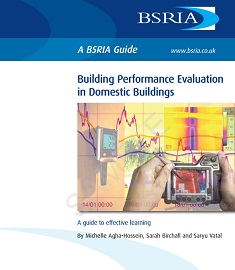Building performance evaluation in domestic buildings
In December 2016, BSRIA published a new Building Performance Evaluation in Domestic Buildings Guide (BG64/2016).
BSRIA claim the industry is still ‘missing the mark’ on developing efficient homes and other residential buildings, despite the best of intentions, with an increasing body of recent academic and industry research revealing that they do not always perform in the way that was originally intended.
Building performance evaluation (BPE) is the process of evaluating how a building performs in use, and can be carried out on both new and existing buildings. It attempts to identify energy inefficiencies and occupant dissatisfaction that result from not performing in accordance with design intentions.
The guide is intended to support the industry by explaining how to use BPE to understand how homes and other residential buildings are performing, and to investigate and address any issues.
It serves as a general introduction to BPE, explaining why it is important, how it can be carried out, and how people can benefit from it, and is aimed at clients, designers, developers, contractors, housing associations and social landlords.
Dr Michelle Agha-Hossein, BSRIA’s Sustainability Consultant, said:
“This guide explains how BPE should be carried out and what activities and methods can be used on projects to address issues related to energy efficiency and occupant comfort. If you are to deliver an efficient and healthy building, we recommend that you to get your copy.”
You can download or purchase the guide at BSRIA Bookshop.
--BSRIA
[edit] Related articles on Designing Buildings Wiki
- BSRIA articles on Designing Buildings Wiki.
- Building performance evaluation BPE.
- Building performance evaluation in non-domestic buildings guide – an introduction to the tests and methods in non-domestic buildings.
- Building performance metrics.
- Domestic building.
- Extended aftercare.
- Handover to client.
- Lessons learned report.
- Maintenance.
- Performance in use.
Featured articles and news
A case study and a warning to would-be developers
Creating four dwellings... after half a century of doing this job, why, oh why, is it so difficult?
Reform of the fire engineering profession
Fire Engineers Advisory Panel: Authoritative Statement, reactions and next steps.
Restoration and renewal of the Palace of Westminster
A complex project of cultural significance from full decant to EMI, opportunities and a potential a way forward.
Apprenticeships and the responsibility we share
Perspectives from the CIOB President as National Apprentice Week comes to a close.
The first line of defence against rain, wind and snow.
Building Safety recap January, 2026
What we missed at the end of last year, and at the start of this...
National Apprenticeship Week 2026, 9-15 Feb
Shining a light on the positive impacts for businesses, their apprentices and the wider economy alike.
Applications and benefits of acoustic flooring
From commercial to retail.
From solid to sprung and ribbed to raised.
Strengthening industry collaboration in Hong Kong
Hong Kong Institute of Construction and The Chartered Institute of Building sign Memorandum of Understanding.
A detailed description from the experts at Cornish Lime.
IHBC planning for growth with corporate plan development
Grow with the Institute by volunteering and CP25 consultation.
Connecting ambition and action for designers and specifiers.
Electrical skills gap deepens as apprenticeship starts fall despite surging demand says ECA.
Built environment bodies deepen joint action on EDI
B.E.Inclusive initiative agree next phase of joint equity, diversity and inclusion (EDI) action plan.
Recognising culture as key to sustainable economic growth
Creative UK Provocation paper: Culture as Growth Infrastructure.























